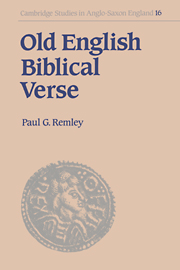Book contents
4 - Daniel and Greek scriptural tradition
Published online by Cambridge University Press: 30 September 2009
Summary
The course of scholarship on the biblical sources of Daniel represents an aberration in the critical history of the Junius poems. For more than one hundred years scholars have speculated that the main source of Daniel is not the Vulgate text of the Old Testament book that lends the poem its name but rather a rare, Old Latin text conforming to the model of Greek scripture. Oscar Hofer, in the first full-length article exclusively devoted to a study of Daniel, published in 1889, cites several verses from a Greek text of the book of Daniel to explain certain non-Vulgate aspects of the poem. His main example adduces the fantastic imagery of the poem's rendition of Nebuchadnezzar's second dream, in which a tree-trunk bound in chains betokens the lapse in governance incurred by the Babylonian tyrant's divinely imposed madness. Hofer's brief remarks anticipate an independently derived suggestion by Robert T. Farrell, who maintained in 1968 that the ‘poet [of Daniel] probably did not use the Vulgate, but rather some Old Latin text’. Farrell's views, circulating more widely than Hofer's, have found some acceptance among Old English specialists. It may be noted further in this regard that scholars have long called attention to the similarity of certain lines in the central section of Daniel, treating the tribulation of the three youths in Nebuchadnezzar's fiery furnace, to an Anglo-Saxon text of Canticum trium puerorum–the liturgical version of the biblical canticle attributed to the three youths. This text is preserved in the famous Vespasian Psalter (London, British Library, Cotton Vespasian A. i (?Canterbury, s. viii1; later provenance St Augustine's Abbey, Canterbury)).
- Type
- Chapter
- Information
- Old English Biblical VerseStudies in Genesis, Exodus and Daniel, pp. 231 - 333Publisher: Cambridge University PressPrint publication year: 1996



